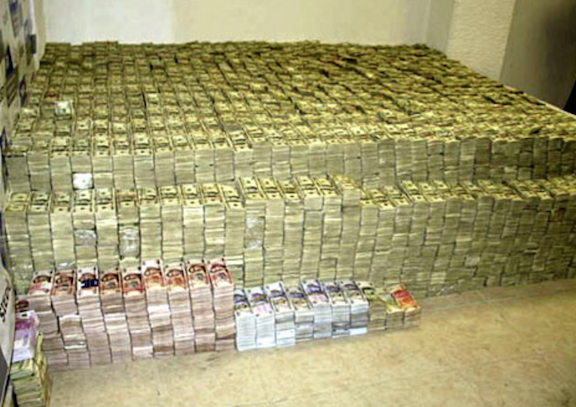TV crime dramas love a good drug bust. In just about every episode, detectives raid warehouses, kick down doors, and uncover duffel bags stuffed with bricks of cocaine and stacks of cash. The busts are dramatic. The scenes are loud. But there's one thing television almost never shows: what actually happens after all that money and narcotics are hauled away.
In the real world, drug seizures are far more complicated than they appear on screen. The logistics, legality, and financial aftermath of a major bust could fill an entire season of its own—and in some ways, it already does. Here's what really happens to the money and drugs seized in raids—and why it matters more than you might think.
Confiscation Is Only the Beginning
When law enforcement confiscates cash, drugs, cars, or other property in a drug-related case, those assets don't immediately go to the government. First, everything is held as evidence. If the crime is serious or if prosecutors anticipate appeals, evidence can be kept for up to seven years.
If the money or property is proven to be unrelated to the crime, it's typically returned to the rightful owner. But determining that can involve a separate trial. This process, known as criminal forfeiture, only applies when the suspect is formally charged with a crime. If convicted, the seized assets are then turned over to the government.
In contrast, civil forfeiture allows police to seize property without filing formal charges, based solely on suspicion of criminal activity. Civil forfeiture has become one of the most controversial tools in modern policing, with critics calling it legalized theft, particularly when innocent people struggle to reclaim their property through costly legal battles.
What Happens To The Drugs?
Seized drugs are usually locked away in an evidence room, tracked meticulously by weight to prevent tampering or theft. From there, they may be destroyed or repurposed for official use. Some are used to train drug-sniffing dogs or to help officers learn to identify narcotics by sight and smell.
In some cases, seized drugs are used in undercover operations, where police orchestrate controlled buys or staged deals in an effort to take down larger trafficking networks. These are high-risk, tightly regulated efforts, and not without controversy.

Photo via US Department of Justice / Wikimedia Commons
What Happens To The Money?
Money, unlike drugs, is rarely destroyed. If the seizure is ruled legal and tied to criminal activity, the funds are typically handed over to the government, or, in many cases, funneled right back to the law enforcement agency that made the bust.
Departments may use the money to upgrade their gear, purchase surveillance tech, fund training, or buy new vehicles. Some agencies have even used these funds to purchase military-grade equipment, raising questions about over-policing and the militarization of local police.
Proceeds from seized assets can also come from auctioning off property, like cars or houses. These funds often go into what critics call a "slush fund"—money available outside of the normal, publicly approved budget. When used transparently, this can be a helpful boost for underfunded departments. When abused, it creates serious accountability problems.
A System Ripe for Abuse?
Supporters argue that asset forfeiture and drug money seizures are effective tools in the fight against organized crime. Opponents argue that the incentives are dangerously misaligned: police departments directly benefit from taking people's property, creating a system vulnerable to abuse.
Ultimately, the fate of confiscated drug money depends on where it was seized, who made the arrest, and how local and federal laws are applied. Ask ten departments how they handle seized assets, and you may get ten different answers.
It's messy. It's murky. And it might not make for fast-paced TV. But if you want to understand the full story of a drug bust, follow the money, not just the headlines.
Examples Of Extremely Large Cash Confiscations
$205.6 Million – Zhenli Ye Gon (Mexico City, 2007)
Still considered the largest drug cash seizure in history, this staggering sum was found inside the upscale Mexico City mansion of Chinese-Mexican businessman Zhenli Ye Gon. Authorities discovered $205.6 million in U.S. currency, along with €200,000, $2 million in Mexican pesos, and large amounts of other foreign currencies. The money was stacked floor to ceiling in a bedroom. Ye Gon was accused of importing massive quantities of pseudoephedrine, a meth ingredient, into Mexico through his pharmaceutical company. He later claimed he was forced to stash the cash on behalf of corrupt officials.
$100 Million – "Operation Casablanca" (Los Angeles, 1998)
This joint U.S.-Mexican operation targeted Mexican banks suspected of laundering drug money for cartels. Over the course of several years, $100 million in drug proceeds was seized from bank accounts and physical locations across Southern California. It remains one of the largest drug money laundering cases in U.S. history.
$22 Million – Miami Cocaine Stash House (2016)
In a raid on a modest-looking home in Miami, federal agents discovered $22 million in cash hidden inside a secret compartment behind a false wall. The money was linked to a large-scale cocaine smuggling operation. Photos of agents pulling bricks of shrink-wrapped $100 bills out of the wall went viral.
$24 Million – Marijuana Trafficking Ring (Atlanta, 2012)
DEA agents busted a trafficking network that shipped marijuana from California to Georgia. In one Atlanta raid, they found $24 million in cash inside a tractor-trailer. The bust was part of a wider takedown that involved dozens of indictments and asset seizures across multiple states.
$30 Million+ – Jose Treviño Morales (Texas, 2013)
Treviño, the brother of a notorious Zetas cartel leader, was arrested in Texas for laundering cartel profits through a quarter horse racing operation. Federal agents seized millions in real estate, vehicles, and cash, estimating over $30 million had been laundered through the business. The case highlighted how cartels use legitimate-seeming U.S. businesses to launder illicit profits.
/2016/11/cocaine.jpg)
/2013/08/GettyImages-506564590.jpg)
/2018/10/money.jpg)
/2013/09/ye-gon-airport-transfer.jpg)
/2016/12/GettyImages-629936626.jpg)
/2019/01/GettyImages-498469796.jpg)
/2020/04/Megan-Fox.jpg)
:strip_exif()/2009/09/P-Diddy.jpg)
/2017/02/GettyImages-528215436.jpg)
/2020/06/taylor.png)
:strip_exif()/2015/09/GettyImages-476575299.jpg)
/2009/11/George-Clooney.jpg)
/2019/10/denzel-washington-1.jpg)
/2009/09/Cristiano-Ronaldo.jpg)
/2009/09/Jennifer-Aniston.jpg)
/2019/04/rr.jpg)
/2009/09/Brad-Pitt.jpg)
/2020/01/lopez3.jpg)
/2018/03/GettyImages-821622848.jpg)
/2019/11/GettyImages-1094653148.jpg)
/2020/02/Angelina-Jolie.png)